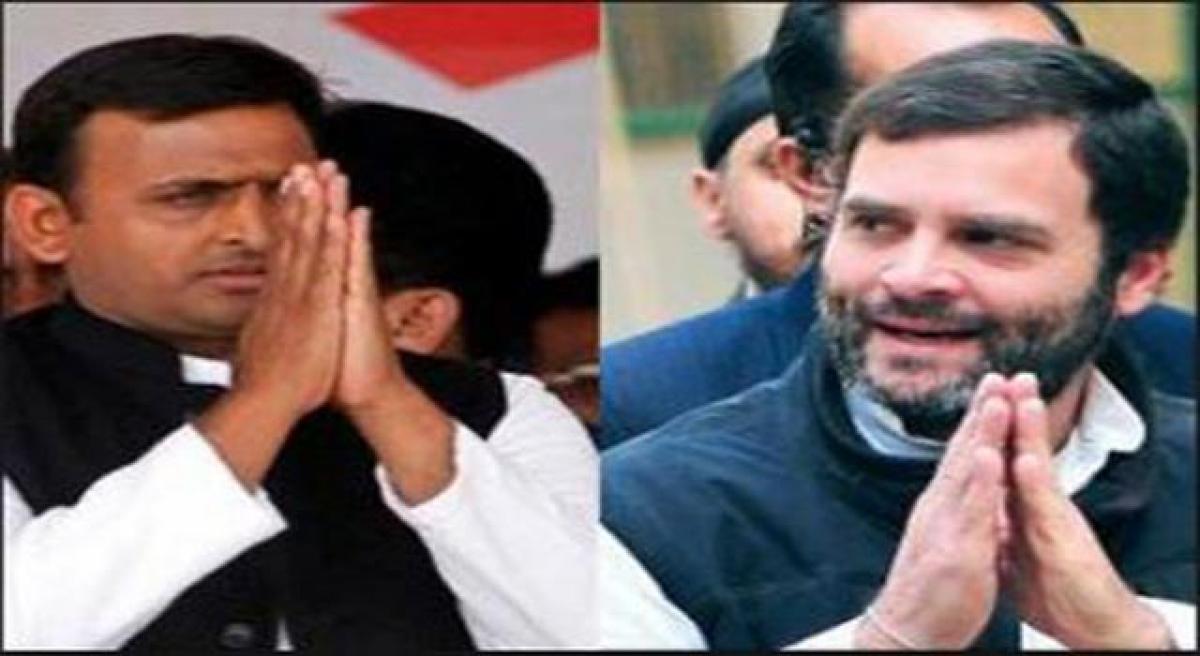Live
- Man Arrested for Allegedly Assaulting 15-Year-Old Girl
- Manchu Lakshmi Shares Cryptic Social Media Post
- Heavy rains cause disruptions in Tirumala and Tirupati
- Former Soldier Builds Temple for Rajinikanth, Installs New Idol on Superstar’s 74th Birthday
- Mohan Babu’s Daughter Manchu Lakshmi's Viral Post Sparks Controversy Amid Family Disputes
- NIST hosts alumni meet
- Upcoming Telugu OTT Releases: A Treat for Telugu Cinema Lovers in December
- Vedamrit Honey’ launched
- Arjun Das Brings Mufasa to Life in Tamil
- Odisha move to prepare maritime perspective plan
Just In

The Congress has much at stake in the outcome of assembly elections in five states, particularly Uttar Pradesh, where its decision to abandon the original plan of contesting all seats is being viewed with some scepticism even within its own ranks.
New Delhi : The Congress has much at stake in the outcome of assembly elections in five states, particularly Uttar Pradesh, where its decision to abandon the original plan of contesting all seats is being viewed with some scepticism even within its own ranks.
The results on March 11 will decide if the Congress decision to ally with the Samajwadi Party and contest about a fourth of 403 seats in Uttar Pradesh will set the stage for the party's revival in the country's most populous state or make its path more difficult. The Uttar Pradesh results are also likely to have a bearing on the party's thinking on forging future alliances.
The Congress is hoping that the results in Uttar Pradesh, Uttarakhand, Punjab, Manipur and Goa will end its electoral drought since the 2014 Lok Sabha polls, when it could manage only 44 seats in the 545-member house, which has 543 elected members.
The party has not won a major state on its own since that debacle. Quite apart from losing Assam, Kerala, Maharashtra and Rajasthan in the assembly elections, the reverses in local body elections in Maharashtra and Odisha have added to the challenges faced by the party.
The Congress entered into an alliance with the Samajwadi Party led by Chief Minister Akhilesh Yadav in an apparent bid to stop its main electoral rival, the BJP, from coming to power in Uttar Pradesh. It settled for 105 seats after some hard bargaining with the Samajwadi Party, which is contesting the remaining 298.
Some Congress leaders told IANS that contesting all the 403 seats would have better served the party's interests. "During the Kisan Yatra we could see a revival of Congress. There were ticket aspirants for almost every seat in the state. But the alliance struck a blow to such hopes," a senior leader, who did not want to be named, told IANS. What will happen to the workers in the remaining 300-odd seats? The workers will go here and there.
The issue of alliances has been a key debating point in the Congress since it went through a rough patch in the mid-1990s. At a brainstorming session at Panchmari in Madhya Pradesh in 1998, the party said it considered "the present difficulties in forming one-party governments a transient phase" and pledged to restore itself to its primacy in national affairs.
Coalitions, it said, will be considered only when absolutely necessary and on agreed programmes. However, there was an apparent change of stance at the brainstorming session in Jaipur in 2013. Jogi said that the Congress at Jaipur expressed its willingness to enter into a coalition "wherever it is needed to defeat the communal forces".
The party has shown more flexibility on alliances since then. Its informal pact with the CPM in the 2016 West Bengal poll came as a surprise to many. It had decided to be a junior ally of the Janata Dal-United and the Rashtriya Janata Dal in the 2014 elections to the Bihar assembly. There is also some speculation that the Congress may go for an alliance in the Gujarat assembly polls at the end of the year.
Senior journalist and political commentator Neerja Chowdhury said getting into winnable "alliances" was a workable strategy for the Congress. "When a party is weak, it has to revive itself. Every party has used alliances as a means towards revival. The BJP won only two seats in the 1984 Lok Sabha elections.
In 1989, it supported V. P. Singh at the Centre. This decision had a major advantage for the BJP in Uttar Pradesh and helped it come to power in the state," Chowdhury said. Chowdhury said if Samajwadi Party-Congress alliance can pull it off in Uttar Pradesh, it will change the mood in the Congress and answer those seeking to write off the party.
By Sidhartha Dutta

© 2024 Hyderabad Media House Limited/The Hans India. All rights reserved. Powered by hocalwire.com







